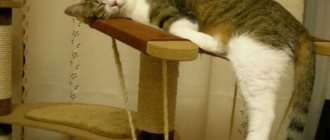Summer cottages come to life with the onset of spring. Those who like to dig around in their plots are coming, and later their loved ones will begin to disappear at the dacha, bringing with them children and pets. Children are guaranteed to be taken away in the fall, but pets are sometimes “forgotten.” This is how entire colonies of cats appear, wandering around the areas in search of food and affection.
In addition to marks, cats bring a bunch of other troubles to the garden plot:
- They brazenly undermine newly planted seedlings, setting up their cat litter in close proximity to the seedlings.
- They break the seedlings, nullifying the painstaking work of growing them in a city apartment.
- They get into fights with other stray or neighbor cats, and then their screams disturb sleep, and the area feels like Mamai has marched with his army.
- They age in flowerbeds where carefully grown flowers grow, leaving dents from their mating on the most delicate greenery.
The outrages already listed are more than enough to declare a “vendetta” on cats. But we are civilized people, and therefore the methods of dealing with cat strays must be bloodless. Traps and snares are not suitable here. There is enough space in the sun for everyone, why should anyone shorten their life.
Fighting cats with plants
It turns out that you can plant catnip somewhere in a corner, add a small pile of sand, and it will be a sandbox for cats. They will stop wandering anywhere around the site, but will come to their favorite grass and do their business in a pile of sand. This is in case you have nothing against cats, but only want to limit their habitat on your site. If you hate them in principle, then you should take the following measures:
- Schisandra, eucalyptus or lavender should be planted around the perimeter of the site. Or you can do both, and the third. You are guaranteed beauty in the area, a smell pleasant to you and hated by cats.
- You can also plant wormwood or coleus.
Usually this measure is very effective. But even if this doesn’t help, there are other tricks!
What to do to drive away someone else's cat?
Equip a high fence
A high, opaque fence in the desired area will be an excellent obstacle for a cat.
A simple but quite effective method that allows you to protect plants and discourage the prankster from the garden. A fence with a minimum height of 1.5 meters is installed along the entire perimeter of the site. It is advisable that the sections are not translucent. A cat is a cautious animal, so it will not risk entering an uncharted area, and even more so when it is not clear what is happening inside and what danger may await it there.
Install an ultrasonic repeller
An effective and proven method for dealing with neighborhood cats. The device helps to remove not only other cats from the area, it is also suitable for scaring away wild animals, for example, hares, as well as stray dogs, which also cause a lot of harm. The repeller does not affect the health of the animal in any way. It emits waves at a certain frequency, and the resulting sound is not liked by pets, so they try to leave the discomfort zone as soon as possible. The device is installed on a pole or tree, and the speaker is directed to the garden bed.
Use aroma oils
Another proven way to ward off other people's cats is to treat the surface in the yard or entryway with an aromatic oil that has a pungent odor. Aroma oils made from plant ingredients such as:
Aroma oils, for example, the scent of orange or lemon, will help scare other people's pets away from your territory.
- orange;
- lemon;
- lavender;
- mint;
- rosemary;
- cinnamon;
- eucalyptus.
Install a sprinkler with a motion sensor
Such a device is installed on the lawn, having previously been connected to running water. As soon as the animal appears on the site, the light sensor will immediately work, dousing the mischief with a stream of cold water. The sprinkler works well to scare away cats from the dacha and helps to drive them out of the yard forever.
How to get rid of a prankster using folk remedies?
If an adult cat or teenage kitten has developed the habit of digging up the ground around bushes and annual plants, it is recommended to cover the plantings with cones or Christmas tree needles. Animals do not like to walk on prickly surfaces, so this product is a reliable protection against digging. And to prevent the cat from even entering the yard, you can fill the entrance with fine gravel.
Another popular folk remedy for getting rid of cats is coffee grounds, the aroma of which the animal cannot tolerate. You can scare away the prankster if you spread the grounds left over from brewed coffee on the garden bed. To prevent cats from going into the garden, shitting or tearing the bark of trees with their claws, it is recommended to wrap the trunk with a sheet of roofing material.
Other means
Sometimes folk methods themselves are not enough to drive the furry bandit away from the site. To prevent cats from marking fences or walls near doors and under windows, it is recommended to use special chemicals with a strong odor that repels the animal. These have proven themselves well:
- "Antigadin";
- Beaphar Stop-it Cat;
- Croci GILL'S Crystal Gel;
- Pet's Lab;
- Nature's Miracle, etc.
First, the marked area is thoroughly washed with the solution, then rinsed with clean water. It is important to regularly erase cat tracks so that when the prankster comes to this place again, he will smell an unpleasant aroma. After the cat discovers an unpleasant surprise several times in a row, it will get tired of fighting with the person. She will either stop marking the walls or move to another place.
Spices in the fight against cats
What is a culinary delight for humans is a natural disaster for cats. The cat's nose suffers greatly from ground black pepper, from mustard scattered between the rows, and from ground ginger. Pleasure is not cheap. To sprinkle spices on all the paths where furry usurpers roam, you have to spend a lot of money. In addition, in the open air, spices quickly lose their properties; they need to be renewed almost every other day. Table vinegar is also useful if you wet rags with it and scatter it where cats most often appear. In addition, gasoline, turpentine, and ammonia are suitable for the same purposes. They have nothing to do with spices, but cats really don’t like them either.
Folk remedies
Strong odors scare off uninvited guests; to do this, scatter and spray plants on the beds where seedlings are planted or the bed has just been dug up. Use:
- Finely chopped fresh citrus peels (orange, tangerine, lemon). You can cut fresh lemon into small pieces and scatter them over the beds;
- Use essential oils instead of citrus fruits. Apply essential oil of any citrus fruit, bergamot, fir, eucalyptus, cinnamon, peppermint to small pieces of fabric or sticks and place them along the beds. A small bottle will last you a long time;
- Sprinkle dry mustard and finely chopped dry bay leaves around the perimeter of the bed;
- Scatter fresh geranium (pelargonium) leaves over the ground;
- Cats cannot tolerate the strong smell of vinegar and ammonia. Apply the product to pieces of fabric and place them in the beds. Once a week, “renew” the scent;
- The smells of fresh garlic and onions repel. Peel them, chop them finely, scatter them on the garden bed;
- Sprinkle ground red and black pepper over the soil.
There are other folk methods of protecting garden lands from uninvited guests.
- Place spruce branches, dry branches of raspberries, gooseberries, and barberries on top of the plantings. The branches are prickly, and the cats’ paws are tender; once they get pricked, the cats won’t go there the next time;
- The beds where carrots, beets, parsley, etc. are sown, are covered on top with film, burlap, sponbond;
- Plant marigolds around the perimeter of the beds; their pungent smell will also scare away cats. In addition, marigolds will protect plantings from insect pests;
Cats love dry and loose soil. Soil that is abundantly watered is unlikely to attract cats to relieve themselves in the garden beds.
And although cats cause a lot of trouble in the garden, we still love them very much because they catch rodents, make the house more comfortable with them, and treat us. There is such a section of therapy - felinotherapy - treatment with cats. Follow the link and you will find out how cats help us heal.
I wish you success!
Ultrasonic repeller
In specialized stores for summer residents you can purchase this battery-powered device. It is better to immediately purchase batteries in reserve. Producing ultrasound, which is not perceived by the human ear, but is well perceived by animals, it will become a reliable protector of the site for the entire time of your stay at your summer cottage. For cats, this sound is painful; they will begin to take the tenth route around the area, which is exactly what we were aiming for. This device will also repel moles, which also do a lot of damage to gardens and vegetable gardens.
How to keep cats away from your property
Nowadays, agents are used that irritate the sense of smell of tailed animals. Among the special preparations sold in specialized veterinary pharmacies and pet stores, spray preparations are used: Antigadin, Anti-cat, etc. They spray fences and beds with them. Their only drawback is that the preparations are quickly washed off by rain, which is why re-treatment is required every time after rain. The drugs are not cheap and many people may not like this method.
Cats are animals that walk on their own. It may make sense to direct them in the “right” direction, luring them with their favorite scents, for example, valerian. Select a small piece of land, away from your beds, and water it with diluted valerian tincture. You can plant valerian, cats will be happy to go there.
Cat repellents
It sounds funny, because we are accustomed to the fact that winged repellents are “boring,” but manufacturers have become more sophisticated and have created an analogue to scare away cats. Such chemical protection preparations against the cat family are of two types:
- Aerosol. Fences and gates are usually treated with this product. And if in a room, then the entire area except the tray. In this way, the cat is trained to use the litter box.
- Granules. For the garden and vegetable garden this is the most acceptable form. The granules are scattered along paths and in places where stray cats are stationed.
Manufacturers claim that the product is environmentally friendly - it contains pheromones from the urine of predatory animals, which repels not only cats, but also dogs. And also these are essential oils and the same spices, cayenne pepper, for example.
Those who have already tried these cat and dog repellents recommend well-known brands:
- Shake-Away;
- Critter Ridder;
- Keep Off.
They say that there are no misfires, they act as written in the annotation.
Rating of cat repellent sprays
| Spray name | Distinctive feature | Price |
| Spray 8 in 1 “Nature's Miracle” | Eliminating odors of marks and urine in the toilet, deterring further mischief | 800 rub Check the price in the store |
| Doctor Vic | Low price and content of natural essential oils in the composition | 215 RUR Check the price in the store |
| Beaphar “Stop – it Cat” | Contains methyl nonyl ketone. Effective against marks from adult cats. Pleasant scent for people. | 750 rub. Check the price in the store |
| Biovax “Scare away? Yes!" | Effective kitten repellent | 215 RUR Check the price in the store |
| Faithful friend “4 in 1” | Multifunctional product with a pleasant aroma for humans | 150 rub. Check the price in the store |
Spray 8 in 1 “Nature's Miracle”
The spray contains essential oils of lemon and thyme - repellent components. Designed for cleaning surfaces damaged by pets. Wet the area to be treated generously and leave for 10 minutes, then remove the moisture with a napkin. Good for removing stains. Effective for scaring away and weaning cats from shitting. But the spray must be used in the absence of children and people with hypersensitivity to odors.
Doctor Vic
Repellent based on essential oil of rue tree to correct the behavior of a pet. Apply to the surface of furniture, floors, flower pots at a distance of approximately 30 cm. Treatment is carried out once a day until the cat stops approaching the treated area. Effective in repelling cats, but may cause an allergic reaction in humans.
Important! Do not spray directly onto houseplants, flowers or soil.
Beaphar “Stop – it Cat”
The main active ingredient is methylnonyl ketone. Apply to objects, furniture and floors once a day until the cat’s bad habit is completely eliminated. Preferably used for adult cats. Effective in combination with an attractive spray.
Biovax “Scare away? Yes!"
Contains essential oils of tea tree and cinnamon. Designed to protect furniture, wallpaper, floors. The surface is treated once a day at a distance of 20 cm. It is effective only for scaring away kittens. Adult animals do not react at all.
Important! Do not apply to animals or plants! May cause allergic reactions in humans.
Faithful friend 4 in 1
The spray contains essential oils of lavender and tea tree, which is the main deterrent component of the product. It is designed to protect furniture, walls, and floors from being scratched and marked by a pet. Spray over the surface at a distance of 25 cm. Apply 1-2 times a day. It has a pleasant aroma that does not irritate human mucous membranes. Has no visible effect of repelling unneutered cats.
Why you need to wean
It would seem, what’s special about the cat going to the garden? This is just earth, and not the master’s bed, a soft carpet or favorite shoes. Meanwhile, it is reckless not to attach importance to this phenomenon, since cat excrement poses a danger to human health. Animals can be carriers of various diseases, such as toxoplasmosis and helminthiasis.
In addition, cat urine has a strong, specific odor of ammonia, which is very difficult to remove. It contains a huge amount of nitrogen salts that can destroy the roots and foliage of plants. The place where the cat loosened the soil layer and peed remains empty this season - nothing will grow on it.
Feline waste is never used as fertilizer for these reasons. If you don’t want your work to be wasted, and the beds in your garden “pleasant” the eye with the lack of harvest, you will be interested to know what to do in such cases, and how to discourage cats and cats from the beds so that they don’t spoil.
Cat repeller: purpose and principle of operation
Cats are cute creatures until they begin to show their stubbornness and animalistic habits. This animal creates a lot of inconvenience when it enters an area where it is prohibited from entering. Repellers will help protect access. They do not injure the cat, but only irritate it, forcing it to quickly run away. The principle of operation of the devices is based on the emission of sounds, odors, unpleasant for the animal, sudden spraying or blinking. A repellent product is useful in the following cases:
- To protect beds and flower beds where cats like to go to the toilet or tear out and chew plants.
- To discourage homeless and neighborhood cats from entering your territory.
- To prevent your pet from entering rooms where he is not allowed to be (for example, a nursery or rooms with a computer, flowers, valuable antiques, etc.).
A cat repeller often becomes the only way to save flowers in an apartment or area from being torn out or eaten by curious cats.











